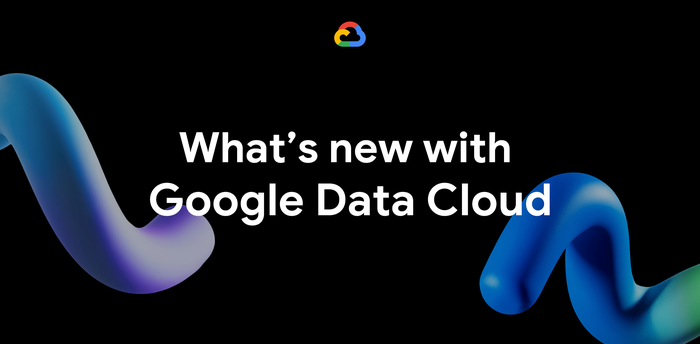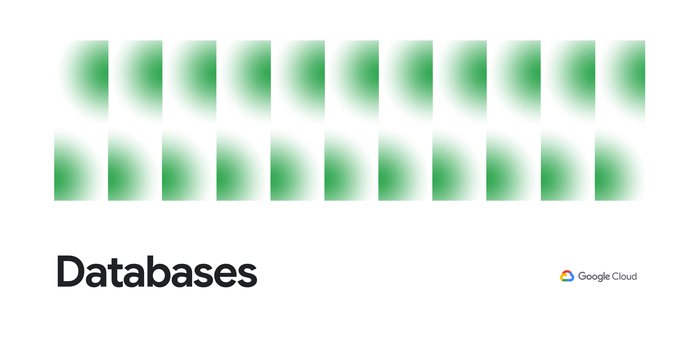Google Cloud databases round-up: January 2024
Kiran Shenoy
Sr. Product Manager, Google Cloud Databases
To consolidate and provide comprehensive information to you, we are launching a new periodic blog series dedicated to Google Cloud's database services. This series will keep you updated on the latest feature releases and innovations within our database offerings.
In case you missed it, Gartner recognized Google as a Leader and Google Cloud was positioned furthest in vision among all vendors evaluated in the 2023 Gartner® Magic Quadrant™ for Cloud Database Management Systems. As a Leader in this report for four consecutive years, we believe Google’s position is a testament to delivering continuous customer innovation in areas such as built-in intelligence, open data ecosystems and unified data offerings. Download the complimentary report.


Now here are some the recent product updates across our databases portfolio:
AlloyDB for PostgreSQL
- AlloyDB utilizes incremental backups, a type of automated and continuous backup solution. This approach leverages smaller files instead of full backups to safeguard your valuable data. As a result, your storage costs are reduced, while the speed of backups is significantly enhanced.
- AlloyDB lets you monitor your AlloyDB instances using the AlloyDB System Insights dashboard or by using the Cloud Monitoring dashboard.
- AlloyDB supports up to 64TiB storage per cluster in certain regions.
- Terraform support for AlloyDB is now generally available.
- Customers can now save up to 52 percent on database compute costs with AlloyDB committed use discounts.
AlloyDB Omni
- AlloyDB Omni, AlloyDB’s downloadable edition that runs anywhere, is now generally available. More details under this launch blog.
- AlloyDB Omni version 15.4.0 is now available. This version includes the following changes:
- pgvector is updated to version 0.5.0
- PostgreSQL is updated to version 15.4
- The AlloyDB Omni Kubernetes Operator version 0.3.0 is now available in preview. This release includes bug fixes and operator improvements. For more information about upgrading AlloyDB using the Kubernetes operator, see Upgrade AlloyDB Omni.
Cloud SQL
- The launch of Cloud SQL Enterprise Plus edition for MySQL and PostgreSQL. This release provides faster read and write speeds, increased availability, and enhanced data protection features, allowing our customers to run more demanding workloads. Learn more under here.
- You can now upgrade Enterprise edition instances to Enterprise Plus edition in place with minimal disruption. Similarly, you can also switch from Enterprise Plus edition to Enterprise edition in place. For more information, see Upgrade an instance by using in-place upgrade.
- Data cache is an optional feature available with Cloud SQL Enterprise Edition plus edition. It stores data pages on high-speed local solid state drives (SSD) to accelerate query processing and is now available for MySQL and PostgreSQL.
- Private Service Connect is now GA for Cloud SQL (MySQL and PostgreSQL). This solution allows you to connect to a Cloud SQL instance from multiple VPC networks that belong to different groups, teams, projects, or organizations.
- You can now configure Cloud SQL for MySQL instances for IAM group authentication. IAM group authentication requires MySQL 8.0 and R20230909.02_00 or later. This feature is in Preview.
- Cloud SQL for SQL Server supports the bulk insert functionality for importing data. This functionality is supported only on SQL Server 2022.
- Cloud SQL for SQL Server supports importing transaction log backups. This can help you reduce downtime when migrating to Cloud SQL using backups.
Memorystore
- Memorystore for Redis Cluster - a new managed service offering for Redis Cluster that is fully OSS compatible, making scaling simple and safe and taking advantage of our pay-as-you-go model. Learn how to perform zero-downtime scaling with Memorystore for Redis Cluster.
Spanner
- Cloud Spanner Data Boost - a break-through technology delivering high-performance, workload-isolated, on-demand processing of operational data to support analytics, reporting with virtually no impact on the existing transactional workload by taking advantage of Google’s disaggregated compute and storage architecture.
- Spanner Price-Performance Improvements: Now providing up to 50% increase in throughput and 2.5 times the storage per node than before, with no change in price. Spanner’s high throughput, virtually unlimited scale, single-digit millisecond latency, five 9s availability SLA, and strong external consistency are now available at half the cost of Amazon DynamoDB for most workloads.
- Managed autoscaler for compute capacity on Cloud Spanner instances is now in preview. With a managed autoscaler, Spanner automatically increases or decreases compute capacity on the instance in response to changing workload or storage needs and user-defined goals.
- Data Catalog support in Cloud Spanner is now generally available. For more information, see Manage resources using Data Catalog.
Bigtable
- Reverse scans in Cloud Bigtable let you read a range of rows backwards.
- Cloud Bigtable app profiles now let you configure request priorities to prioritize certain workload data requests over others. This feature is available in preview.
- Cloud Bigtable change streams is a feature that allows you to track changes to your Bigtable data and easily access and integrate this data with other systems.
- Committed use discounts (CUDs) provide deeply discounted prices in exchange for your commitment to continuously spend a certain amount on Cloud Bigtable compute resources — nodes — for one year or three years.
- Cloud Bigtable instance, cluster, and table metadata is automatically synced to Data Catalog, a feature of Dataplex, for improved data discovery and governance.
Firestore
- Firestore added support for much needed disaster recovery features by our enterprise customers; point-in-time recovery (PITR) and scheduled backups. These features will provide data protection against human errors and disasters.
- Firestore added support for three new Eventarc supported triggering destinations: Cloud Run, Google Kubernetes Engine (GKE), and Cloud Functions (2nd gen).
- Firestore added support for OR operator and SUM and AVG query functions.
Database Migration Service
- Database Migrations are becoming simpler with Duet AI capabilities for Database Migration Service. Check out Duet AI for Cloud Database Engineers.
- Database Migration Service now supports schema and code conversion for Oracle to Cloud SQL (PostgreSQL). This allows customers to convert their code and schema and migrate their data, all within the Database Migration Service tool. Learn more: blog, video and Session at Cloud Next ‘23.
- You can now migrate MySQL and PostgreSQL databases to Cloud SQL instances or AlloyDB clusters created outside of Database Migration Service. This approach is especially useful when utilizing Terraform or other Infrastructure as Code tools to manage your infrastructure. See Migration jobs overview for more.
- Database Migration Service now supports selecting PostgreSQL version 15 when migrating to AlloyDB for PostgreSQL. See Supported source and destination databases in AlloyDB for PostgreSQL migrations.
- Database Migration Service now supports migrating data to an existing instance for Cloud SQL (MySQL and PostgreSQL).


Final thoughts
Dive into our comprehensive blogs to stay updated on all the latest developments, and explore our detailed product documentation for an in-depth understanding of our managed database services.


